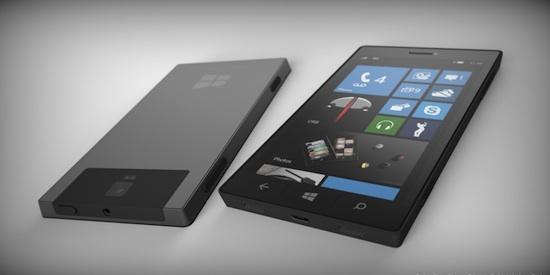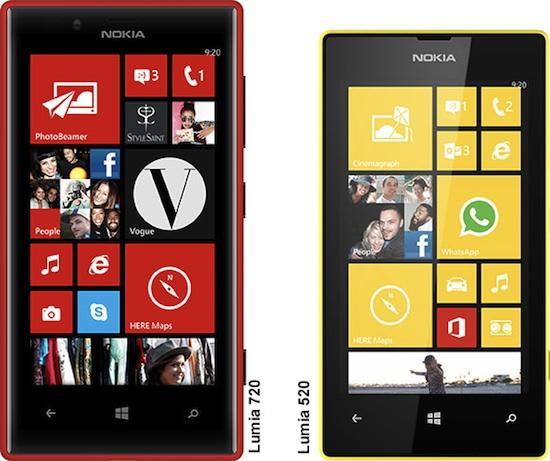
Microsoft has a shoddy track record of admitting they would build their own smartphone, but that could change according to an SEC filing by Nokia outlined by our own Alex Wagner. Though a Surface phone has always been a sort of "Plan B" for Microsoft, an idea largely dependent on the reception of Windows Phone 8, a Surface phone could give Microsoft the developer support it needs to build its ecosystem.
Microsoft's Windows Phone 8 operating system remains a shaky number three in the marketplace with around 4 percent market share. However, in terms of sales of Windows Phone devices, they slipped to the fourth spot worldwide in Q4 2012 behind BlackBerry according to Gartner and IDC. With the rumors building of a Z10 launch on AT&T and other carriers, Windows Phone needs a boost. Would a Surface phone help?
It's safe to say that the overall depth of Microsoft's market share in the mobile ring is not that impressive compared to Android and iOS. With the news BlackBerry is slowly grabbing market share, Microsoft must respond. Though Nokia remains fully dedicated to Windows Phone, it would be wise for Microsoft to develop their own brand like Google has with their Nexus devices. Nokia may be the main reason Microsoft has been able to grab the market share it has, but they shouldn't be the only one. Microsoft needs to diversify its portfolio and working on an internal device would be the safest bet. Microsoft has always had a lot riding on the Finnish manufacturer and a new SEC filing reveals Nokia might be getting cautious. Will Microsoft's internal ambitions be a marquee for its detachment from Nokia in building their own device? Nokia's not ruling it out.
Nokia is largely responsible for the effect Windows Phone has had in the mobile market. Much to the dismay of its employees, Nokia switched its focus from Symbian to Windows Phone back in 2010, and it's been an uphill struggle ever since for the Finnish company. Yet, the dedication and investment Nokia has displayed with its Lumia devices proves they're pushing hard in 2013 but it clearly isn't enough for Windows Phone to be competitive.
Mobile World Congress saw the release of two new low and mid-range devices that will expand Nokia's current crop of handsets in the mobile space. The Lumia 520 and 720 are not world-beaters, but their price points put it on the map for wider adoption should you feel the need to test Windows Phone out without breaking the bank. These devices will be coming stateside, but their largest impact in the mobile arena will be in Europe and developing markets.
With that said, Nokia recently outlined in its SEC filing some new concerns over Microsoft's plans for Windows Phone in 2013. Hot on the heels of Bill Gates' displeasure of Windows Phone's market strategy in mobile, Nokia admitted the following:
"Microsoft may make strategic decisions or changes that may be detrimental to us. For example, in addition to the Surface tablet, Microsoft may broaden its strategy to sell other mobile devices under its own brand, including smartphones. This could lead Microsoft to focus more on their own devices and less on mobile devices of other manufacturers that operate on the Windows Phone platform, including Nokia."
With that said, a Microsoft Surface phone would put Microsoft in an entirely new space with different possibilities. It could also distance the demand for Nokia devices. Never has Microsoft truly lent credence to the idea of a Microsoft-branded smartphone which is why Nokia's SEC filing is rather peculiar and exciting. Microsoft has only dealt their hand as a manufacturer of the Surface tablet line, and a smartphone has never really made its way into their agenda.

If Nokia, Microsoft's most dedicated hardware manufacturer of Windows Phone devices, admits concerns over a Microsoft-made smartphone, we ought not write the idea off.
A Surface phone may be a new avenue for the company, but it would open up a myriad of new resources for them as well. The benefits of internal development would be tremendous. It's no secret that their ecosystem is lacking in most regards, and a stronger developer community could give Windows Phone Store the boost it needs.
Developer handsets are part of the reason Nexus devices are so important to Google. Though they're not widely adopted by the average consumer, developers who are interested in growing with the operating system have the option to with a device created in accordance to Google's guidelines. Direct software updates, and attention from Google means Nexus devices attract a unique subset of consumers. Nexus devices build strong dedication to the Android ecosystem as well. Internally, a Surface phone would be important for Microsoft like Nexus is important to Google.
A Surface smartphone might not be the big seller Microsoft needs to gain market share, but it's just one of many ways they can gain momentum.
Often times, I've criticized Microsoft's relevancy in mobile. It's marketed as a quick way to get in and out of your smartphone to keep up with your fast-paced lifestyle, but the idea still isn't developed. It has not gained momentum on a few levels, and the operating system's moderately slow software updates are the main reason. Windows Phone lacks a core task manager, intuitive multi-tasking, and a notification center. It also lacks interest and support from developers. But by and large, its main struggle is its premature ecosystem and lowly app selection. Apps are here to stay - look no further than Apple's App Store for proof, and it's upsetting that Microsoft isn't doing much to spark development. A Surface phone couldn't hurt you, Microsoft.
A strong ecosystem is part of the reason Apple has garnered as much attention as it has with their App Store. Apple has also had a strong developer base since the beginning of the iPhone series. How much of Apple's loyalty is attributable to its ecosystem? That's a question too big to answer, but you can guarantee that every dime spent with Apple's App Store is a convincing argument for purchasing an iPhone.
This sort of consumer loyalty and internal developer support harbored by Apple's ecosystem is proof a Microsoft-branded device could help the Windows Phone 8 OS.
If I were Microsoft, I'd push to build a developer community centered around a Microsoft-branded smartphone. This would bring the fight right to BlackBerry's doorstep, and be the sort of competition both operating systems would benefit from. Building a strong internal core of developer support will drive the maturity of the Windows Phone ecosystem. I'd like to see a Surface phone for this reason, and if Nokia's SEC filing means anything, we should at least keep the idea alive in the back of our minds.
What do you think is Windows Phone's main struggle? The small app selection? Few devices? Paltry ecosystem? Would you be interested in a Windows Phone device direct from Microsoft? You know the drill, Dear Reader. Your thoughts on Windows Phone are just as important as mine, so take it away in the comments below. Thanks!